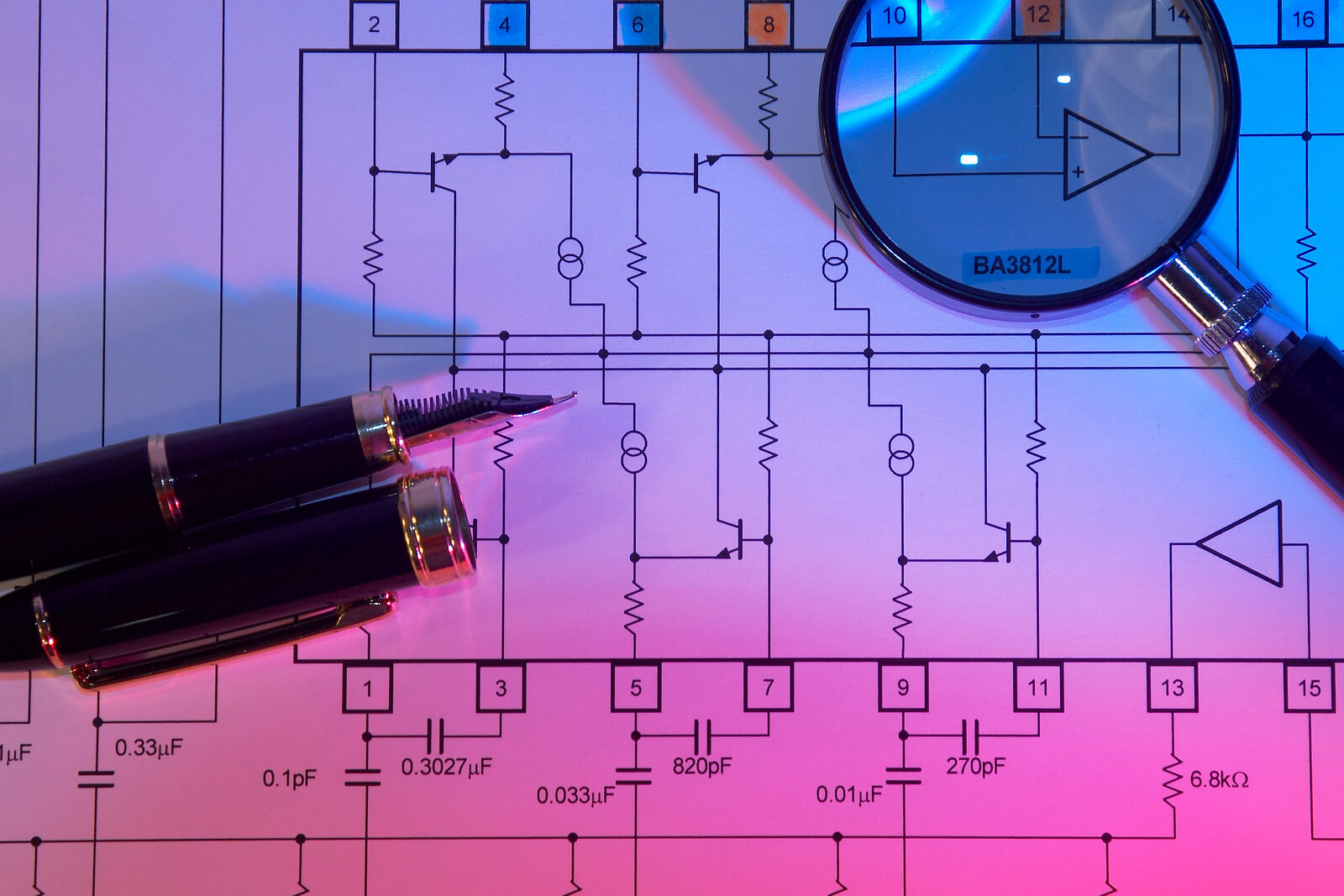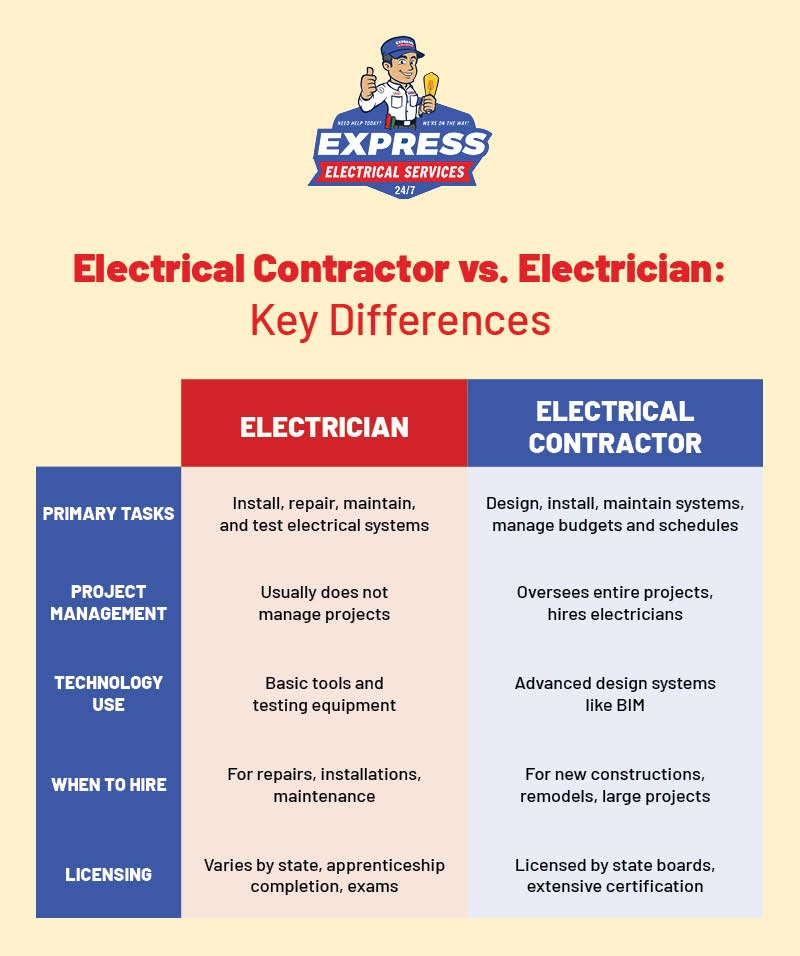The Difference Between an Electrical Contractor and an Electrician

The difference between an electrical contractor and an electrician may not be obvious, but they have very different roles, as defined by the National Electrical Contractors Association. While an electrician may physically come to your home to perform electrical work, an electrical contractor can be a business person or firm specializing in construction work involving the design, installation, and maintenance of electrical systems. The following guide will assist you in choosing between hiring an electrical contractor vs. an electrician.
What is an Electrician?
An electrician is someone trained and licensed to work on electrical equipment and systems. The licensing requirements often differ from those for an electrical contractor, depending on the state, but an electrician can be employed or self-employed as an electrical contractor. They can be apprentices enrolled in a training program, or if they’ve completed an apprenticeship program, they may be classified as a journeyman, a tradesperson who works for someone else.
A master electrician is one who has completed the training and testing required of a journeyman and who is qualified to perform a wider range of duties with more tools in their belt.
Electricians install, repair, test, maintain, and troubleshoot electrical systems and equipment. Consider contacting an electrician for summer maintenance on your electrical system, wiring, or electrical box repairs, or for help installing new electrical fixtures or switches in your home.
If you’re in the Orange County area of the Golden State and need electrical work done on your home, call Express Electrical. Our licensed electricians are experienced in a variety of jobs, big and small.
What Is an Electrical Contractor?
While an electrician can contribute their skills to any type of project, an electrical contractor has a broader role in residential, commercial, and other types of construction. They’re directly involved in the design and implementation of building systems. Rather than focusing on the labor aspect of a project, they are directly involved in choosing the products and systems to use as partners in the building process, working alongside architects, property owners, and consultants.
Electrical contractors may use sophisticated computer design systems such as building information modeling. They’re licensed by the California contractor licensing board, and are often in charge of an entire project.
Express Electrical is rated as one of the best electrical services contractors in the region. Our staff of electricians is qualified in what they do, with proper California certification and licensing. They’re familiar with the National Electric Code and its additional state requirements.
When to Hire an Electrician vs an Electrical Contractor
Electricians handle electrical tasks and projects such as:
- Repairs
- Installation
- Maintenance
- Electrical panels
- Circuit breakers
- Outlets
- Switches
- Wiring
- Household appliances
- Outdoor lighting
- Inspections
In contrast, you may want to hire an electrical contractor for more specialized services, like designing the electrical systems in a new building. They’re qualified not only to perform electrical work but also to hire other electricians to work for them. If you’re planning on remodeling your home or adding a new room, an electrical contractor will have the necessary knowledge. They can:
- Determine the feasibility and constructability of designs
- Deliver a computer design plan with a higher level of detail
- Ensure the safety of the systems they work on
- Manage the project budget to help keep it on target
- Schedule the work and begin construction
- Provide support during the initial design phase
Choosing the Right Electrical Professional
If you’re thinking of hiring an electrical contractor or electrician, there are a few qualifications you should check first.
An electrical professional should have the appropriate training and/or schooling for the task required and the relevant experience. In California, they must have certification from one of the 85 state-approved electrical training schools. Before starting work, an electrical professional should have the appropriate type of insurance coverage, as well as all required permits, as deemed necessary by the State of California.
Many people will ask friends and family for recommendations, but if you want to hire a certified, skilled electrician or electrical contractor for your home, you can count on the team at Express Electrical.

Express Electrical Services: Specializing in Electrical Service, Installation, and Repair
Our company of licensed electrical contractors has been serving Greater Los Angeles, Orange County, and Ventura County since 1982. We employ professional electrical technicians and have live operators who answer calls 24 hours a day, 7 days a week. Our electricians are the most well-trained and knowledgeable in the industry, while our trucks are stocked with the equipment and parts needed to fix problems in a single visit. To request service, reach out to us online or call (805) 250-5807 today.
Frequently Asked Questions
Do electrical contractors handle both residential and commercial projects?
Electrical contractors are trained electricians who, depending on their level of training and work experience, are either qualified to do residential projects or both residential and commercial projects. More safety measures and knowledge are necessary for a commercial project.
In the LA County region, contractors must have 150 hours of schooling along with 4,500 hours of work experience to become residential electricians, or 150 hours of technical training and 8,000 hours to become general electricians. If you’re looking for an electrical contractor but don’t know where to start, contact Express Electrical for answers.
Can electrical contractors design and plan electrical systems?
Certified electrical contractors in the Sunshine State can design, plan, install, maintain, and repair residential and commercial electrical systems. In California, contractors must upgrade their knowledge through continuing education and become recertified every three years.
Should I get multiple estimates before hiring an electrician or contractor?
Most experts agree that getting three estimates is standard practice before having work done on your home or business. The team at Express Electrical is happy to provide you with a convenient, no-hassle estimate to help you make an informed decision. We offer competitive pricing and stand behind our work.
